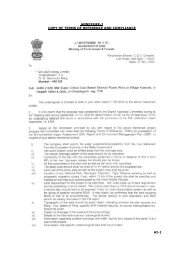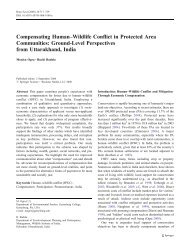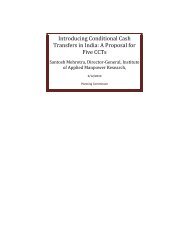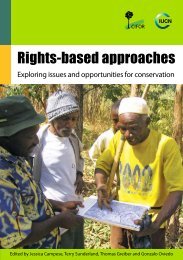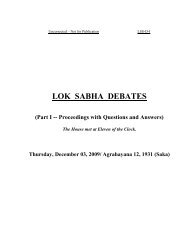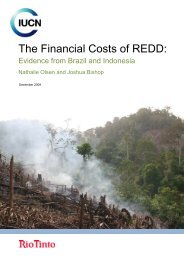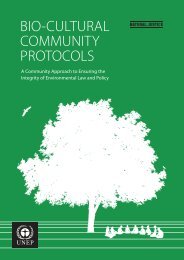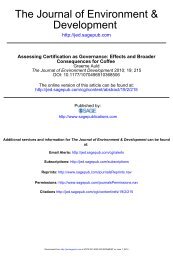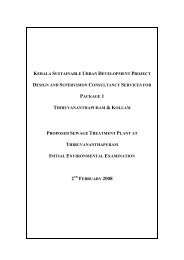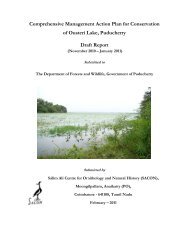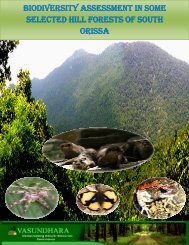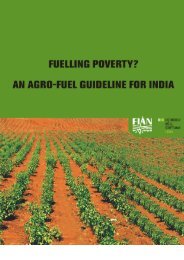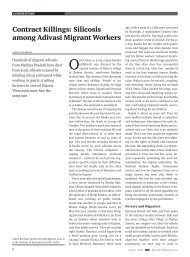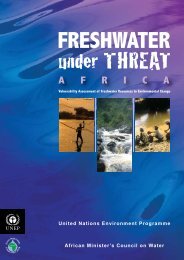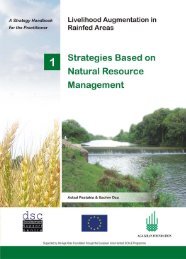Integrated River Basin Planning – Replicable ... - India Water Portal
Integrated River Basin Planning – Replicable ... - India Water Portal
Integrated River Basin Planning – Replicable ... - India Water Portal
You also want an ePaper? Increase the reach of your titles
YUMPU automatically turns print PDFs into web optimized ePapers that Google loves.
<strong>Integrated</strong> <strong>River</strong> <strong>Basin</strong> <strong>Planning</strong>: <strong>India</strong> and the EU share experience on policy and practice<br />
<strong>Water</strong> Policy, Legislation, Management and Institutions in Kerala<br />
5.2 <strong>Water</strong> management and institutions<br />
in Kerala<br />
<strong>Water</strong> resources management is presently operated at two administrative levels<br />
as illustrated in Figure 7 and Figure 8, respectively. One is the secretariat level,<br />
which assists respective ministers, and secondly at the field level, which generally<br />
operates at the districts. A description of the major institutions and agencies<br />
within the <strong>Water</strong> Resources Department involved in water resource management<br />
and their role is given below.<br />
Figure 7 <strong>Water</strong> Resources Management at Secretariat level<br />
Agriculture<br />
Department<br />
Bio-diversity Board<br />
Environment<br />
Department<br />
Figure 8 <strong>Water</strong> Resources Management at District level<br />
Animal Husbandry<br />
Department<br />
Mining &<br />
Geology Department<br />
Revenue Department<br />
Groundwater<br />
Department<br />
Field level<br />
Departments<br />
Land Use Board<br />
Panchayat<br />
Department<br />
Urban Affairs<br />
Department<br />
Fisheries<br />
Department<br />
Health & Family Welfare<br />
Department<br />
<strong>Water</strong> Resources<br />
Department<br />
Secretariat level<br />
Departments<br />
Devaswom Board<br />
5.2.1 Kerala <strong>Water</strong> Authority<br />
Forest & Wildlife<br />
Department<br />
Industries<br />
Department<br />
Local Self<br />
Government<br />
Department<br />
The Kerala <strong>Water</strong> Authority (KWA) was established in 1984 as an autonomous<br />
body of the Government of Kerala. It has been developed from the Public Health<br />
Engineering Department, its parent institution, for the development and regulation<br />
of water supply and wastewater collection and disposal in the state of Kerala.<br />
Though community-managed traditional water supplies in the form of open dug<br />
wells and ponds have been in existence for generations, the first form of protected<br />
water supply in Kerala started at Ernakulum in 1914. Another protected pipe water<br />
system for Thiruvananthapuram started in the 1930s by the erstwhile Travancore<br />
State. After the formation of the present Kerala State, various urban and rural<br />
piped water supply schemes were initiated. In tune with the national thinking,<br />
Kerala has adopted a comprehensive State <strong>Water</strong> Policy. The State Government<br />
has set a target of expanding water supply coverage to all districts. The Authority<br />
works for design, execution, promotion, operation, maintenance and financing<br />
of schemes for the supply of water and for the collection and disposal of the<br />
wastewater. It renders the necessary services to the Government in relating to<br />
water supply and collection and disposal of wastewater in the State of Kerala.<br />
Kerala <strong>Water</strong> Authority is also responsible for the collection of wastewater and<br />
disposal in the State of Kerala.<br />
Town <strong>Planning</strong><br />
Department<br />
5.2.2 Groundwater Department<br />
The Groundwater Department (GWD) is the nodal department in the state for the<br />
monitoring and management of the groundwater. This department collects and<br />
processes monthly data at the State Data Centre for 871 stations. These data are<br />
computerized and processed. Under the Hydrology II Project funded by the World<br />
Bank, these data are being processed at river basin scale. Data are collected for<br />
baseline and trend status analysis. Groundwater quality meets the BIS standards<br />
for drinking purpose in most stations except a few locations (Palaghat, Aleppey).<br />
The GWD has three water quality testing laboratories, i.e. at Thiruvananthapuram,<br />
Ernakulum and Calicut. The department provides training to staff from time to<br />
time for data management practices. In the Hydrology Project-I, training was<br />
provided extensively. The department also helps in public awareness raising. They<br />
educate school children on rainwater harvesting and water quality testing. The<br />
Groundwater Department collects groundwater samples for testing parameters<br />
such as pH, electrical conductivity, total dissolved solids, carbonate, bicarbonate,<br />
alkalinity, total hardness, calcium, magnesium, potassium, silica, chloride, fluoride<br />
and arsenic at few locations. From 1997 water quantity and quality data at district<br />
and taluka (lower administrative unit) level are being collected. <strong>Water</strong> quality data<br />
are collected four times a year and water level is collected monthly.<br />
5.2.3 Irrigation Department<br />
<strong>Water</strong> Transport<br />
Department<br />
The Irrigation Department aims at providing a most efficient Irrigation system to<br />
the state of Kerala, which functions as the backbone for the improvement of<br />
agriculture in the state. Canals provide safe drinking water as well as water for<br />
irrigation and navigation. In order to improve the irrigation potential, innovative<br />
minor irrigation schemes have also been implemented in almost all parts of the<br />
36 37



